Dentures – Hoover, AL
Flawlessly Restore All the Parts of Your Smile

Just because you’re missing some or all your teeth doesn’t mean you don’t deserve to smile beautifully. Thanks to dentures in Hoover, there is a perfect solution to your tooth loss. These natural-looking restorations can replace anywhere from just a few teeth to an entire arch and restore your smile and biting power back to their former glory. Contact our trusted team at Moulton Dentistry of Hoover for a consultation to see if dentures are right for you.
Why Choose Moulton Dentistry of Hoover for Dentures?
- Extensive One-on-One Time from Dentist Dedicated to Patients
- Experienced and Accommodating Dentist and Team
- Natural-Looking Dental Materials Used
Who’s a Good Candidate for Dentures?

If you’re missing teeth, then you are likely an excellent candidate for dentures in Hoover. Whether you lost your teeth due to periodontal disease, malnutrition, an accident, or some other unfortunate circumstance, most adults are able to get dentures. Continue reading to learn more about the consequences of tooth loss and what qualifies you to replace them with dentures.
Effects of Missing Teeth
Tooth loss can have a major effect on your well-being. According to the American Academy of Periodontology, there are numerous negative consequences of missing teeth. They include facial sagging, difficulty speaking, challenges while eating, and low self-esteem. When you replace your missing teeth with dentures, you can improve all of these areas of your life!
What Qualifies You for Dentures?
Dentures are ideal for those who are missing multiple teeth. Depending on the number of teeth you are missing and where they are located in the mouth, we can put together a custom treatment plan to meet your needs. The main qualification that you must meet is being in good oral health. This means that if you have any dental issues, like tooth decay or gum disease, they need to be eliminated ahead of time. After your existing teeth and gums are healthy, we can move forward with the rest of the process.
Alternative Tooth Replacement Methods
If dentures aren’t something that you are interested in, there are a variety of other solutions out there available to address tooth loss. Here are some of the other ones that we offer:
- Dental Bridge: A dental bridge works by “bridging” the gap in your smile with a replacement tooth. The replacement tooth, called a “pontic,” is supported by two dental crowns that are placed on adjacent teeth.
- Dental Implants: A dental implant is a titanium, screw-like post that is surgically inserted into the jawbone to support a replacement tooth. This requires that you have sufficient jawbone. Dental implants have a higher upfront cost, but they are made to last for many years.
Learn More About Dental Bridges
Learn More About Dental Implants
Types of Dentures
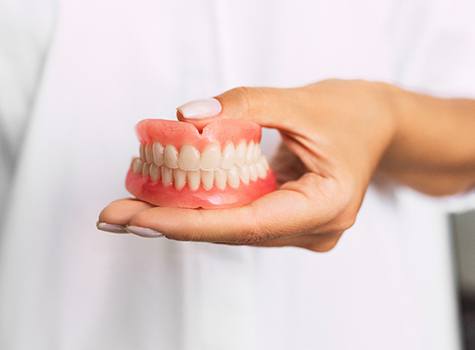
There are multiple different types of dentures available. This way, we can cater to a variety of tooth-replacement needs. During your consultation, we will examine your smile to choose the right tooth replacement option for you. Here are the different types of dentures we offer.
Partial Dentures
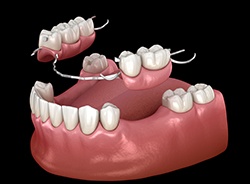
Partial dentures are ideal for those who still have some healthy teeth in their arch. A partial dentures fits between the surrounding teeth, kind of like a puzzle piece. They are held in place with clasps. This way, you can replace missing teeth in different locations of your mouth with a single prosthetic.
Full Dentures
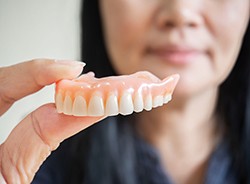
Full dentures replace an entire arch of missing teeth. Instead of being held in place by clasps full dentures remain stationary thanks to the shape and suction of the mouth. Full dentures are made with a gum-colored base and hold natural-looking replacement teeth.
Implant Dentures
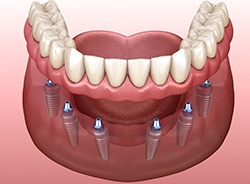
If you want a longer-lasting, more stable option, implant dentures are an excellent choice. These dentures are held into place with titanium, screw-like dental implants that are surgically placed into the jawbone to act as tooth roots. They allow for additional bite force and prevent bone loss from occurring over time.
The Benefits of Dentures

Having gaps in your grin makes once-basic tasks like eating food, speaking clearly, and smiling authentically much more challenging. Fortunately, regardless of how many teeth you have remaining, Dr. Moulton can fit you with a fully customized set of dentures. These prosthetics are uniquely designed to restore your abilities and enhance your appearance.
Continue reading to learn more about the benefits of this versatile treatment, and feel free to contact us for additional information.
Psychological Benefits
Losing adult teeth can impact how you feel about yourself and interact with people around you. You’re used to being perceived a certain way, but once teeth go missing, the changes to your appearance can leave you feeling so anxious about judgment that you avoid spending time with others. This can put a real dent in your self-esteem or even lead to depression.
Once your new dentures are in place, you’ll look and feel like your most beautiful and confident self, allowing you to enjoy a more engaging calendar of activities and interact more meaningfully with others.
Clearer Enunciation
Your teeth are crucial in your ability to speak because you press your tongue against them in specific ways to enunciate different sounds. Spaces in your smile can lead to a lisp or other alterations to your speaking patterns that make it difficult to be easily understood when you talk.
Dentures act as artificial teeth to fulfill this function so that you can once again enjoy conversing with others. However, it can take about a month for your tongue and other supporting muscles in your mouth to acclimate to wearing them. Practicing challenging pronunciations at home can help ease you through this transition.
Improves Nutrition
Many patients with tooth loss also develop gastrointestinal issues or malnutrition because they can’t thoroughly grind their food enough to be efficiently swallowed and digested. Plenty of essential nutrients you need to support your oral and overall health are contained in harder foods that are difficult to bite into or chew without a full set of teeth, like raw fruits and veggies or tough meats.
Thankfully, your dentures restore much of your chewing power so you can enjoy more wholesome meals.
Preserves Oral Health
If you still have natural teeth in your mouth, they’re likely to shift out of alignment to fill in any spaces left behind by ones that went missing. This can wear down your enamel unevenly and prematurely, leaving you at an increased risk of cavities, chips, cracks, and other issues that can harm your dental health.
Wearing dentures ensures your teeth remain in their rightful positions to safeguard your smile.
Expands Opportunities
Did you know that according to a study shared in 2019, the probability of having a job was negatively associated with poor oral health? One of the first things that others notice about you is the condition of your grin, and if yours is full of gaps, you might be remembered for the wrong reasons.
Having a full set of teeth allows you to speak and act confidently so that you’re sure to make a positive first impression at job interviews, romantic excursions, or other significant events. Plus, it leads to more opportunities and successes at work or school.
How Dentures Are Made
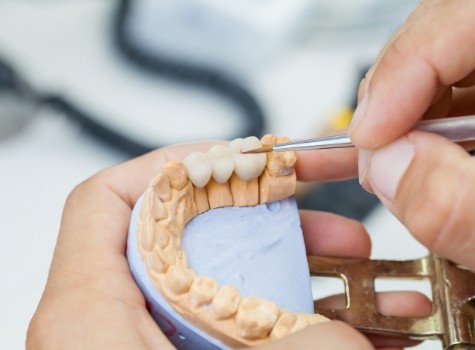
If you’ve chosen to get dentures, perhaps you’d like to learn how they’re made. After all, details on the crafting process let you see what these prosthetics can do. To that end, we at Moulton Dentistry of Hoover are here to help. Below is a summary of what goes into dentures and the methods used to create them. By reading it over, you can better understand your future restorations. So, whether you need a partial, full, or implant denture, here’s how it all comes together.
What Are Dentures Made Of?
Dentures are comprised of two primary parts: a base and a set of artificial teeth. Each has features necessary for treatment to succeed. As proof, consider the following descriptions:
- Denture Base – As a foundation, the base supports a denture’s artificial teeth. Labs often make one from various materials, ranging from acrylic and porcelain to even metal or nylon. The employed substances differ depending on the type of denture you get.
- Artificial Teeth – Per their name, artificial teeth are a denture’s tooth-replacing portions. They’re usually made of resin or porcelain so that they look (and feel) lifelike. That said, full dentures tend to include porcelain ones, as these can be abrasive on adjacent teeth.
The Denture Creation Process
Because dentures are custom-made for a patient’s mouth, creating them involves a multi-step process. It adheres to the methods below:
- Step 1: Your dentist will take a dental impression of your upper and lower gums. The resulting model will be sent to a lab to help create the dentures.
- Step 2: After being crafted, the lab will return the wax dentures to the dentist for a fitting. Should the patient and dentist approve, the restorations will be sent to the lab for completion.
- Step 3: A technician will boil the dentures to remove their wax portions. They’ll then place the appliance in a flask to pour plaster. From there, the flask is placed in hot water to melt the dentures.
- Step 4: The lab worker will make holes in the artificial teeth so new material can attach to them. A liquid separator is also added to the plaster layer to prevent the acrylic from sticking. The same acrylic is then injected into the flask to replace the wax.
- Step 5: The worker will remove the plaster to reveal the prosthetics. Later, they’ll place the dentures in an ultrasonic bath to remove leftover plaster.
- Step 6: After cutting away excess acrylic, the technical will polish the restorations
- Step 7: The patient will return to the office for fitting and final adjustments.
Adjusting to Your New Dentures
When you first get dentures, it’s normal to feel a certain amount of discomfort. This effect may result in mild soreness and difficulty with speaking and eating. However, you can rest assured that your mouth will adjust over time. In fact, the restorations will feel similar to natural teeth sooner than you’d think.
Still, there are ways you could speed up the adjustment. Some excellent methods include eating soft foods, exercising your face, and experimenting with adhesives. You should also note whether your aches or discomforts persist. In that case, contacting your dentist is best – the prosthetics may need further tuning.
Understanding the Cost of Dentures

After learning about dentures, you’re probably more excited than ever to start rebuilding your smile. However, you may be wondering about the cost of dentures in Hoover before you decide to move forward with the process. During your consultation, our team at Moulton Dentistry of Hoover will conduct an oral examination and explain which factors will affect the final price. Following the appointment, you’ll have a better understanding of what you can expect to pay for your treatment.
Factors That Affect the Cost of Dentures
Multiple considerations can influence the price of dentures in Hoover, including:
- Any work needed beforehand like tooth extractions or gum disease treatment
- The number of teeth you’re missing
- The type of acrylic used for the base (part that is dyed to match color of gum tissue)
- The materials your denture will be made of (usually porcelain or acrylic)
Is cost a priority? If so, you may be tempted to opt for cheaper dentures. Even though the upfront cost is certainly lower, they tend to break easily and require replacement much sooner than you’d expect. That’s why quality should always be of utmost importance, regardless of the cost.
Are Implant Dentures More Expensive?
Yes, implant dentures are generally more expensive than traditional ones. However, there’s a good explanation for that. They require oral surgery and the placement of multiple dental implants, making them more reliable for everyday use since they do not shift out of place. Many patients discover this method of tooth replacement is well worth the investment because of several tremendous benefits.
Not only do dental implants stimulate the jawbone, but they can last decades or even a lifetime with proper care and maintenance with help from your denture dentist in Hoover. That means you won’t have to worry about replacing your dentures nearly as often!
Does Dental Insurance Cover Dentures?
Dentures are considered a major procedure which is why most dental insurance plans will cover approximately 50 percent of their cost. Certainly, every policy is unique, meaning the amount of coverage provided will vary from patient to patient. If you have any questions about your plan, contact your insurance provider or ask our dental team for assistance. We will gladly review the details of your policy and do everything possible to maximize your benefits and reduce out-of-pocket expenses.
Other Options for Making Dentures Affordable
We understand not everyone has dental insurance, which is why we offer other ways to make your dental bills much easier to manage. With CareCredit financing, you can split up the total cost of your denture treatment into smaller, budget-friendly monthly installments. Options even come with little-to-no interest!
We also offer in-office dental memberships. Among many other benefits, you receive 20 percent off the price of procedures. Learn more when you give us a call!
Ready to begin down the path to a beautiful, complete smile? Contact us today to schedule a denture consultation so we can answer any questions you might have.
Dentures Aftercare

Once your smile is restored with dentures, you’ll be able to enjoy eating and speaking more like you did prior to tooth loss. However, to keep making the most of your prosthetics, it’s important to practice consistent dental hygiene. Even if you have no natural teeth remaining, you should plan to visit Dr. Moulton regularly for routine checkups. When you have dentures covering your gum tissue all day long, you might not notice the early signs of developing issues like gum disease or oral cancer. Meanwhile, our team knows what to look for and can address any areas of concern as soon as we see the indicators.
Continue reading below to learn more about how to maintain your dentures to prevent oral issues, and feel free to contact us with any additional questions.
Removable Dentures
Remove After Eating
One of the greatest advantages of having dentures is that you can enjoy a more wholesome diet to keep your body in peak condition. Although there are a few dietary restrictions, you’ll be able to bite and chew much more effectively. However, just like your natural teeth, your restoration is prone to catching bits of food that can attract harmful bacteria that lead to gingivitis.
Removing and rinsing your prosthetics after every meal can keep plaque buildup at bay. It clears away any unwanted particles and neutralizes potential acid damage from the ingredients you’ve consumed. Remember to use room-temperature water or cooler because overly hot temperatures can warp the acrylic base and lead to ill-fitting dentures.
Clean Your Restoration
In addition to running them underwater after you eat, you should plan to remove your dentures both morning and night for a thorough cleaning. You can scrub them with a soft-bristled toothbrush and a small amount of mild dish soap or denture cleanser to get rid of residue, germs, and leftover adhesive if you use it.
If you’re going to bed afterward, leave your prosthetics in a container of water or special soaking solution so they don’t dry out and crack or lose their shape.
Keep Your Dentures Safe
Your artificial teeth can become quite slippery when they’re wet and covered with soap. Although they’re intended to last, they’re not entirely invincible. Dropping to the floor from the bathroom countertop can be enough to crack, chip, or break them.
To keep them whole, place a towel underneath you during cleanings that can mitigate the force of a fall. Also, try to keep them out of the reach of pets and younger children who might not handle them very carefully.
Remove Dentures When You Sleep
Although you may feel tempted to drop into bed after a long day with your dentures still in your mouth, doing so could cause problems. Your gums need a break from the constant pressure of supporting them, or they could become tender or develop sores. You’re also more likely to develop gum disease and even pneumonia if you fall asleep while you’re wearing them.
Instead, leave them to soak overnight in water or a soaking solution. This can kill off up to 99% of germs, so they’ll be refreshed in the morning when you reinsert them. This also gives your gum tissue a well-deserved rest so it doesn’t become achy or inflamed.
Notice Changes
Attention to your oral condition is key to preventing potential problems. If you notice red or irritated gums, raw spots, or signs of infection, please contact us right away so we can determine the underlying issue. Ill-fitting dentures can cause additional friction and may need to be relined or replaced.
Also, if your artificial teeth are cracked or broken, call us and schedule an appointment. You might feel tempted to fix it yourself with at-home materials like super glue, but these can be toxic and aren’t intended for oral use. Our team can safely repair them without making matters worse.
Denture FAQs
How Long Will You Have to Wait to Get Dentures After Your Teeth are Pulled?
In some cases, patients can receive their dentures immediately after getting their teeth removed. In these situations, the denture can act as a kind of bandage while the wounds heal. However, it’s a bit more common for patients to receive their prosthetic after their mouth has healed a bit, usually six to eight weeks after the treatment is done.
If you’re interested in implant dentures, you’ll need to wait for the implants to fully fuse with the jaw before getting the denture. This will take anywhere from four to six months depending on how quickly you tend to heal.
Can I Sleep with My Dentures?
We advise against wearing your dentures to bed. Your prosthetic will adhere to your gums via suction, which may impede circulation in the gums. Moreover, it’s possible for bacteria to sneak under your prosthetic, and these can start to build up if you don’t ever take them off.
Removing your dentures as you sleep gives your gums an opportunity to breathe, and gives you time to soak them in an antibacterial solution to remove anything that has built up during the day.
Will It Hurt to Get Dentures?
While recovering from a tooth extraction, it’s common to experience a fair amount of discomfort. In comparison to that, adapting to your new dentures should be a breeze.
You may develop denture sores when you first get your prosthetic, as it’ll take some time to for the soft tissues in your mouth to toughen up. You could experience these on and off for anywhere from a few weeks to a few months, but they should fade and become less severe over time. If you find that these issues get worse instead of better, let us know so we can make sure that there’s not a problem with your dentures.
What Can’t You Eat with Dentures?
Modern dentures are incredibly effective at chewing up food, but there are some foods that you should still probably stay away from. For one, foods that break into small shards, like nuts, can be a problem. These tiny pieces can get caught under the prosthetic and irritate the gums. Harder foods can also be a problem, as they can damage your dentures if you eat them too often.
Then there are some foods that are nearly impossible to eat, like peanut butter and gummy candies. These foods can easily pull your dentures out of place, which makes them incredibly hard to chew with your prosthetic.
